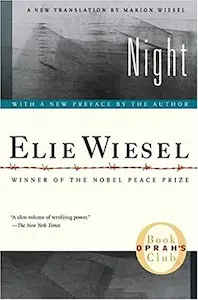Night - Summary
Elie Wiesel

Introduction
In his powerful memoir, “Night,” Elie Wiesel recounts his harrowing experiences as a young Jewish boy during the Holocaust. Published in 1956, Wiesel’s book provides a firsthand account of the atrocities committed by the Nazis, shedding light on the horrors of the concentration camps and the profound impact they had on the lives of millions. Through vivid storytelling and poignant anecdotes, Wiesel’s “Night” serves as a haunting reminder of the importance of remembrance and the enduring strength of the human spirit.
Life Before the Darkness
In the opening chapters of “Night,” Wiesel introduces us to his childhood in the small town of Sighet, Transylvania. He describes a life filled with religious devotion, close-knit family ties, and a sense of security. Wiesel’s father, a respected community leader, instills in him a deep love for Judaism and its traditions. However, this idyllic existence is abruptly shattered when the Nazis invade Hungary in 1944.
The Descent into Darkness
As the Nazis intensify their persecution of Jews, Wiesel and his family are forced into the ghettos and eventually deported to Auschwitz-Birkenau. The horrors they encounter are beyond comprehension, as they witness the dehumanization and systematic extermination of their fellow prisoners. Wiesel’s vivid descriptions of the gas chambers, the crematoriums, and the daily struggle for survival are both shocking and deeply unsettling.
Loss of Faith and Identity
Throughout “Night,” Wiesel grapples with the existential questions that arise in the face of such unimaginable suffering. As he witnesses the senseless brutality and the silence of God in the face of evil, Wiesel’s faith is profoundly shaken. He questions the existence of a benevolent deity and struggles to reconcile the atrocities he witnesses with his understanding of the world. Wiesel’s internal struggle reflects the broader crisis of faith experienced by many survivors of the Holocaust.
The Bond of Father and Son
Amidst the darkness, Wiesel finds solace and strength in the unwavering love and support of his father. Their bond becomes a lifeline, a source of hope in the face of despair. Wiesel’s father becomes his reason to keep fighting, to endure the unimaginable. However, as the war progresses and the conditions worsen, Wiesel is forced to confront the painful reality that survival may require sacrificing this precious connection.
Liberation and the Aftermath
After enduring the horrors of Auschwitz and Buchenwald, Wiesel is finally liberated by the Allied forces in 1945. Yet, the end of the war does not bring immediate relief or joy. Wiesel describes the challenges faced by survivors as they attempt to rebuild their lives and come to terms with the magnitude of their loss. The physical and emotional scars of the Holocaust continue to haunt them, and the process of healing and rebuilding proves to be a long and arduous journey.
The Power of Remembrance
One of the central themes in “Night” is the importance of remembrance. Wiesel writes with a sense of urgency, determined to ensure that the atrocities committed during the Holocaust are never forgotten. He believes that by bearing witness to the horrors of the past, we can prevent similar atrocities from occurring in the future. Wiesel’s memoir serves as a powerful testament to the resilience of the human spirit and the necessity of remembering the darkest chapters of history.
Impact and Legacy
Since its publication, “Night” has become one of the most widely read and influential accounts of the Holocaust. Wiesel’s memoir has been translated into numerous languages, reaching audiences around the world. It has become a cornerstone of Holocaust literature, offering readers a deeply personal and poignant perspective on the Holocaust. Wiesel’s work has also inspired countless individuals to confront the injustices and prejudices that persist in our society, emphasizing the importance of empathy, tolerance, and the pursuit of justice.
Conclusion
Elie Wiesel’s “Night” is a haunting memoir that provides a firsthand account of the Holocaust. Through his vivid storytelling and powerful anecdotes, Wiesel forces us to confront the darkest depths of human cruelty and suffering. His memoir serves as a reminder of the importance of remembrance, the enduring strength of the human spirit, and the need to confront and learn from the atrocities of the past. “Night” stands as a testament to the resilience of the human spirit and a call to action against hatred and indifference.